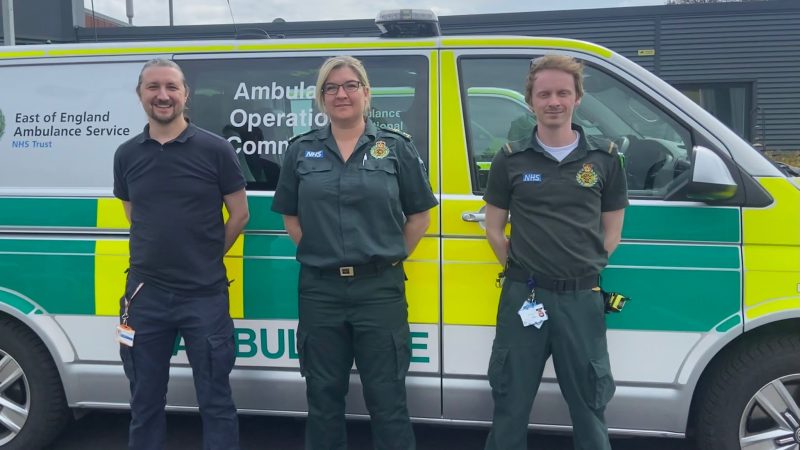
My name is Claire Fuller, I am a Mental Health Nurse. Throughout my nursing career, I have seen how difficult it can be for patients, to access the right mental health support at the right time. This is why, when an opportunity arose to be part of a team that would explore new ways of working, I jumped at the chance.
Having previously worked in a mental health liaison situated in an hospital emergency department, I have first-hand experience of the avoidable distress that can be experienced by local people in a mental health crisis.
Often, patients would end up being conveyed to a hospital emergency departments by ambulance crews, for mental health assessments even when there is no medical need due to lack of other options. Aside from the distress this caused patients, this would also put pressure on the hospital and sometimes result in long delays.
Since March 2023, I have been working for the local ambulance service (East of England Ambulance Service NHS Trust) on secondment from the mental health trust (Essex Partnership University NHS Foundation Trust). My role within the ambulance service is to help introduce new and better ways of working, to improve access and outcomes for patients suffering with their mental health. I am also helping to upskill ambulance clinicians and strengthen pathways so that the patients using the 999 system can gain access to the right mental health support early without the need for attendance to an emergency department.
In April this year, I helped bring the ambulance service and mental health services together to roll out a new initiative, the Mental Health Joint Response Car. This new way of working, brings mental health care and support to the patient, and in most cases, the patients’ own homes. The service is now covering mid and south Essex, 7 days a week 13.00hrs to 01.00hrs when we know we usually see the greatest number of people needing help.
On board this specialist vehicle we have an ambulance clinician, Paramedic or Emergency Medical Technician, who can assess patients’ physical health and a mental health nurse who can triage any mental health needs and direct or refer to the appropriate service. This is a huge benefit for local people, their loved ones and ambulance crews, enabling joined up working with mental health crisis support and the ambulance service to deliver a high-quality level of service and care. The new car can assist with mental health presentations in the community, to include but not limited to personality disorder in crisis, relapse of psychotic or affective illness or ambulance crew support around issues involving legal framework, e.g. Mental Health Act and Mental Capacity Act and any concerns regarding risk. Consequently, clinical staff and mental health professionals are now better equipped to offer better integrated care in the right place at the right time.
Delivering mental health support in a timely manner within patients’ familiar surroundings, has the potential to reduce further stress or any escalation of their crisis and can avoid the need for inpatient admissions. In the first week of the initiative, the Mental Health Joint Response Car had 36 calls, referred by ambulance clinicians, 21 patients were seen face to face and 15 received telephone triage and advice. This meant we were able to keep 95% of patients we had contact with, out of the emergency department and were able to meet their required needs. This initiative has been well received and used by ambulance clinicians within the mid and south Essex area.
Having worked on the Mental Health Joint Response Car myself, I have seen first-hand how much this service is needed. Previously, ambulance clinicians had limited access to mental health referral pathways for patients in the community. Being involved with the launch, promoting the service and meeting patients’ mental health needs on scene, has been by far the most rewarding job that I have done. My goal is to continue to help improve and transform local services, working together to continue the initiative for the benefit of the patients in a mental crisis.
An example of great work carried out by Paramedic Robin Barton & Mental Health Nurse Glenn Pearson-Moase on the Mental Health Joint Response Car:
“Sue said she felt completely supported by you, you listened to her fully and she felt that your mental health knowledge helped her immensely. She described you and your crewmate as brilliant, a fantastic crew. Sue is very impressed at the amount of help available to her that she wasn’t aware of”.
Feedback such as this highlights the value of such schemes and the strength, we can gain from working together rather than in isolation to get the right care to the patient for the benefit of all.